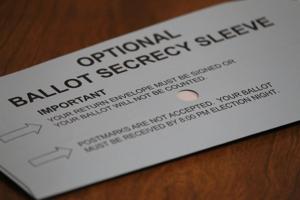Oregon campaign finance reforms catch criticism from activists

(The Center Square) – Oregon has no limits on how much money one person can spend on its elections. Voters and state lawmakers agree that needs to change.
Last fall, Oregonians voted to allow state lawmakers to pass statewide campaign finance reform. To date, political campaigns in the state report contributions and expenditures to the Secretary of State. Historically, spending limits have been up to local officials to decide.
Cities like Portland passed campaign finance limits of their own in 2018, limiting individual and political action committee (PAC) donations to $508. In Portland, unions and business groups are banned from throwing money into candidate races, but small donor committees have free rein. Portland Mayor Ted Wheeler was sued for breaking those rules last fall after he allegedly donated $150,000 to his own 2020 reelection campaign.
Councilwoman Jo Ann Hardesty says the sudden increase in board diversity, a gay man, two women and three people of color, over one election cycle is no coincidence.
She hopes HB 2680 will be a model for campaign finance reform and a more diverse Oregon government.
“I did something crazy like running a grassroots campaign, going door to door, hosted 150 house parties and limiting my campaign contributions,” Hardesty said. “It is my hope that this is something that will spread all over the country.”
Hardesty is the first Black woman elected to the Portland City Council.
According to the National Conference of State Legislatures, Oregon is one of five states with no limits on campaign contributions. It’s also one of 11 states with no limits on individual donors.
House Bill 2680, sponsored by state Rep. Dan Rayfield, D-Corvallis, would cap political campaign contributions for individuals and committees at $1,000 in local candidate and statehouse races, $2,000 in circuit court judges and state senate races, and $2,900 for other state elections. Local governments could adopt lower limits for local elections.
Committees run by political parties could spend up to $10,000 on local and state legislative races under the bill. Such committees could spend $30,000 on other statewide offices. Limits on caucus political committees would stand at $40,000 and $25,000 for small-donor political committees accepting $250 in individual contributions. Exemptions include contributions out of a candidate’s pocket to their principal campaign committee.
Donating to political campaigns comes with tax credits of $50 for individuals and $100 for joint filers. State lawmakers want to expand those perks.
HB 2680 would also create the Small Donor Election Program offering a public match for state legislative races, including primaries and general elections. The program applies to in-state contributions of $10,000 from 400 persons for state senate races and $6,000 from 250 persons for statehouse races.
Some who testified on the bill took issue with its spending limits on “persons” rather than “individuals.” State law defines the former as an individual, a corporation, a limited liability company, and even a club or partnership. Such groups are not required to disclose the source of their funds under Oregon law.
Dan Meek, a lawyer with the group Honest Elections Portland, worries the bill’s word choice could open a state-sized loophole for big donors.
“This would render the contribution limits illusory,” Meek testified. “It would also destroy the ability of voters to know where the campaign money is originating.”
Meek recommended state lawmakers pass a competing campaign finance bill, HB 3343, whose language centers on “individuals.” The bill, which has 21 co-sponsors as of Tuesday, remains in committee.
HB 2680’s supporters include Planned Parenthood of Oregon, several unions and liberal groups. Others like the League of Women Voters of Oregon say its limits are too high and leaves too much guesswork for the courts. PCUN, Oregon’s Farmworker Union, is also concerned the bill could leave out committee boards of mixed immigration status.
The bill’s most significant sticking point stems from one amendment allowing PACs to rake in unlimited contributions except for those from small donor committees. It would set a $2,900 limit on persons and political committees and a $14,500 limit on small donor committees. Critics point to it as proof HB 2680 is not the change Oregonians voted for last fall.
“We are not going to accept a bill like HB 2680 which is little more than window-dressing,” wrote Nathalie Paravicini, who serves on the Pacific Green Party’s State Coordinating Committee. “It appears that representatives are trying to accommodate money instead of representing We the People, their constituency.”
HB 2680 was voted out of the House Rules Committee on Tuesday with the support of 13 co-sponsors. It awaits a House floor vote.
Disclaimer: This content is distributed by The Center Square
